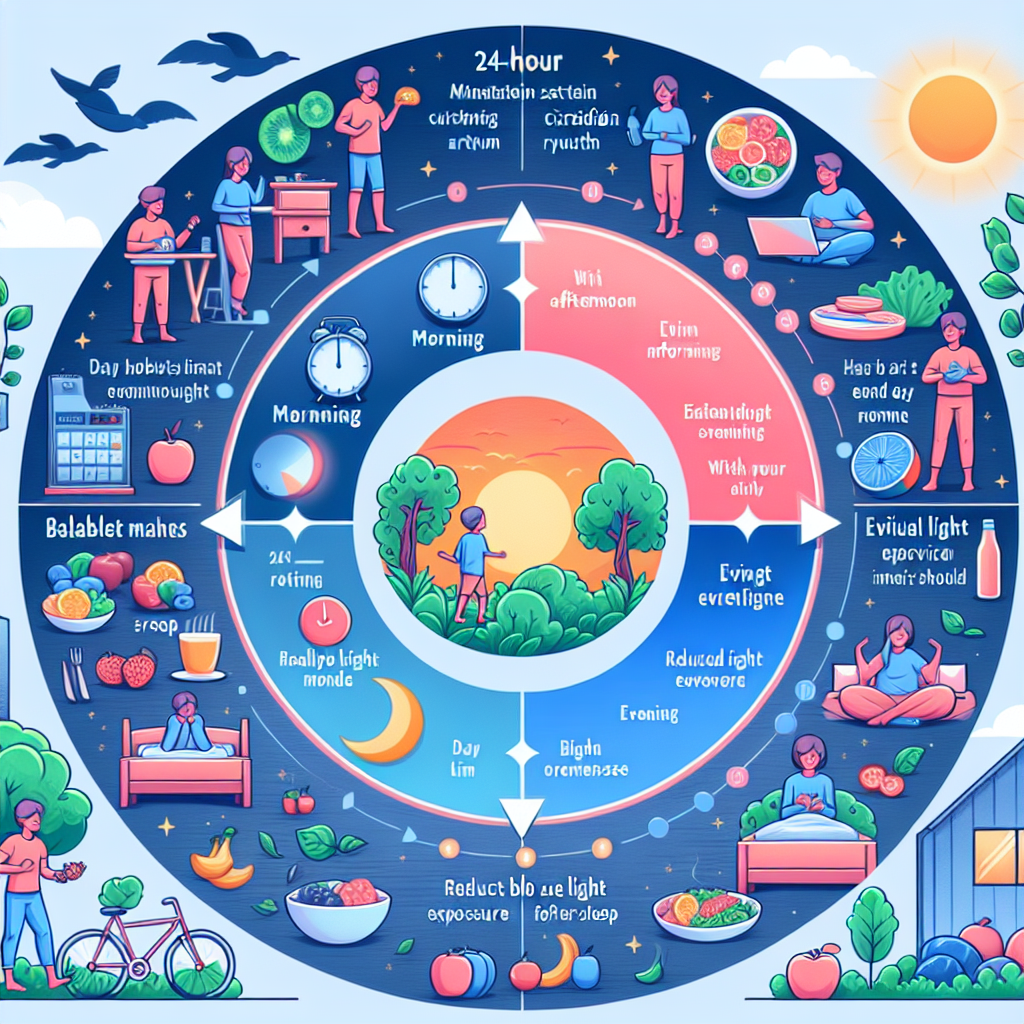Daily Habits for an Optimal Circadian Rhythm

Start optimizing your circadian rhythm today! Learn about daily habits that can help you achieve an optimal circadian rhythm. Don’t wait, start your journey to better health and vitality now. Click here to learn more.
Maximizing Your Circadian Rhythm: Daily Habits to Follow
The circadian rhythm, often referred to as the “body clock,” is a natural, internal system that regulates the sleep-wake cycle and repeats roughly every 24 hours. It can refer to any biological process that displays an endogenous, entrainable oscillation of about 24 hours. These rhythms are
The Power of Routine: Daily Habits for a Healthy Circadian Rhythm

The power of routine cannot be overstated when it comes to maintaining a healthy circadian rhythm. Our bodies are biologically programmed to follow a 24-hour cycle, which regulates our sleep-wake patterns, eating habits, and other physiological processes. This internal body clock, known as the circadian rhythm, is influenced by external cues such as light and temperature. However, our daily habits and routines can also significantly impact this rhythm, either positively or negatively.
Firstly, one of the most crucial habits for an optimal circadian rhythm is maintaining a consistent sleep schedule. Going to bed and waking up at the same time every day, even on weekends, helps to regulate your body’s internal clock. This consistency signals to your body when it’s time to sleep and wake, leading to better quality sleep and increased daytime alertness.
In addition to a regular sleep schedule, exposure to natural light during the day is also essential. Our circadian rhythms are designed to align with the rise and fall of the sun. Therefore, spending time outside in natural light, especially in the morning, can help reset your circadian rhythm. If getting outside isn’t feasible, consider using a light therapy box or similar device that mimics natural sunlight.
Moreover, regular physical activity is another key habit for a healthy circadian rhythm. Exercise has been shown to help regulate the sleep-wake cycle, improve sleep quality, and reduce insomnia and depressive symptoms. However, it’s important to note that the timing of exercise can impact your circadian rhythm. Exercising too close to bedtime can interfere with sleep, so it’s generally recommended to finish exercising at least a few hours before bed.
Diet also plays a significant role in regulating our circadian rhythms. Eating meals at regular times each day can help synchronize your body’s internal clock. Conversely, irregular eating patterns can disrupt your circadian rhythm and negatively impact metabolic health. It’s also advisable to limit caffeine and alcohol, especially in the hours leading up to bedtime, as these substances can interfere with sleep.
Lastly, establishing a relaxing pre-sleep routine can help signal to your body that it’s time to wind down and prepare for sleep. This routine could include activities such as reading, taking a warm bath, or practicing relaxation exercises. It’s also beneficial to create a sleep-friendly environment, which is dark, quiet, and cool, to promote better quality sleep.
In conclusion, maintaining a healthy circadian rhythm is not just about adhering to a strict schedule. It’s about creating a lifestyle that supports your body’s natural rhythms and processes. By incorporating habits such as a consistent sleep schedule, daily exposure to natural light, regular physical activity, a balanced diet, and a relaxing pre-sleep routine, you can optimize your circadian rhythm for better sleep and overall health. Remember, it’s not about perfection, but consistency. Small, consistent changes can have a significant impact on your circadian rhythm and, consequently, your health and wellbeing.
Aligning with Nature: Daily Habits to Optimize Your Circadian Rhythm
The circadian rhythm, our body’s internal clock, plays a crucial role in regulating our sleep-wake cycle, metabolism, and even mood. It is primarily influenced by light and darkness in our environment, aligning us with the natural cycle of day and night. However, in our modern world, where artificial light and digital screens are ubiquitous, our circadian rhythm can easily be disrupted. This disruption can lead to a host of health issues, including sleep disorders, obesity, depression, and even certain types of cancer. Therefore, it is essential to adopt daily habits that can help optimize our circadian rhythm, aligning it more closely with nature.
One of the most effective ways to optimize your circadian rhythm is to expose yourself to natural light as much as possible. Our bodies are designed to wake up with the sunrise and wind down with the sunset. Therefore, try to spend time outside in the morning, preferably within the first hour of waking up. This exposure to natural light will signal your body to stop producing melatonin, the hormone that makes you feel sleepy, and start producing cortisol, which helps you feel alert and energized.
In contrast, limit your exposure to artificial light in the evening. The blue light emitted by electronic devices such as smartphones, tablets, and computers can trick your brain into thinking it’s still daytime, delaying the production of melatonin and making it harder for you to fall asleep. Consider setting a digital curfew, turning off all electronic devices at least an hour before bedtime. You can also use blue light blocking glasses or install apps that filter out blue light on your devices.
Regular physical activity is another important factor in maintaining a healthy circadian rhythm. Exercise can help regulate your sleep-wake cycle by raising your body temperature slightly, then allowing it to drop and trigger feelings of drowsiness a few hours later. Try to schedule your workouts in the morning or early afternoon, as exercising too close to bedtime can interfere with your sleep.
Your eating patterns can also affect your circadian rhythm. Try to eat meals and snacks at regular intervals throughout the day, and avoid eating late at night. Your body needs time to digest food before you go to sleep, and eating late can disrupt this process. Additionally, consuming caffeine or alcohol close to bedtime can interfere with your sleep cycle, so it’s best to limit these substances.
Lastly, establish a consistent sleep schedule. Going to bed and waking up at the same time every day, even on weekends, can help regulate your circadian rhythm. This consistency reinforces your body’s sleep-wake cycle and can help you fall asleep and stay asleep throughout the night.
In conclusion, optimizing your circadian rhythm is not a one-time event but a daily practice. By exposing yourself to natural light, limiting artificial light, exercising regularly, eating at consistent times, and maintaining a regular sleep schedule, you can align your body’s internal clock with nature’s rhythm. These habits not only promote better sleep but also improve overall health and well-being. So, start today, and let the rhythm of nature guide you towards a healthier lifestyle.